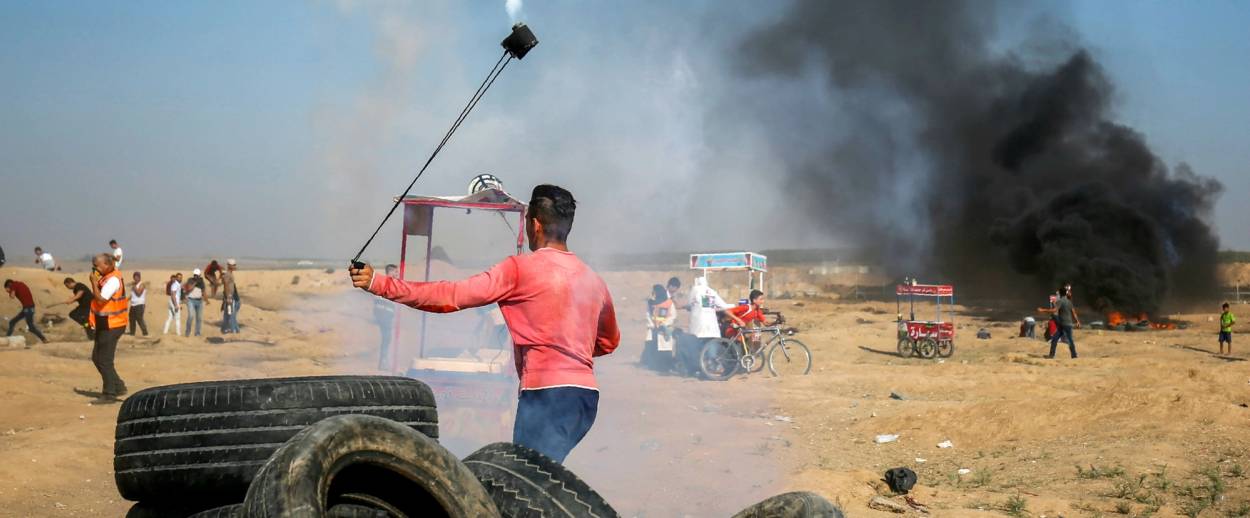How to Report on the Next War in Gaza
The five commandments of not falling for fake news and malicious spins




After Hamas spent months repeatedly attacking Israel’s border with Gaza, including dispatching fiery kites that consumed 2,260 acres of land—that’s just about three Central Parks laid to waste—Israel responded this week by shutting the Kerem Shalom crossing, banning anything save for food and medicine. It’s a completely rational move—no sane nation ought to continue and furnish a terrorist organization dedicated to its destruction with the means and goods to do so—but nonetheless a blow to Gaza’s economy, already struggling under Hamas’ mismanagement. If you’re the betting sort, it’s safe to say that another round of fighting between Israel and Hamas is coming soon, an opinion both sides seem to share.
It’s like déjà vu all over again.
Because we’ve lived through this predicament before, and because we have a little bit of time to prepare for the next round of violence, whenever it may erupt, it might be helpful to take a moment and think about what to do—or, more accurately, what not to do—when the shooting starts. Obviously, very few of us are in a position to impact the tactical decisions made on the front lines or the strategic decisions made in the corridors of power. But all of us are in a position to report on this coming conflict accurately and responsibly. For better or for worse, social media have given each of us a small publication to curate and control. Taken together, these feeds, as they’re so bawdily called, shape much of the way so many of us see and understand the world, and there’s no reason whatsoever to handle them stupidly or irresponsibly, especially when it comes to something so monumental as life and death.
How to be better about reporting the next war in Gaza? Easy. Just follow these five commandments:
Thou Shalt Not Share Memes: Or, at least, be very slow and judicious before you pass something along. That kindly and dedicated French doctor who the Palestinian Information Center’s Twitter feed tells you just arrived at Gaza to help the victims of Israeli aggression may turn out to be Katherine Heigl, posing on the set of Grey’s Anatomy. As we’ve seen all too clearly on too many occasions, our appetite for titillation is endless, and the truth is the price we pay for our amusement. So put that picture or that video or that quote aside for an hour or two, do some basic research to confirm its claims, and, even then, think thrice before hitting “publish.”
Thou Shalt Take Everyone’s Word With a Grain of Salt: Especially when said word is coming from the side you support. There’s an old journalistic adage that informs you that if your mother tells you she loves you, you ought to check it out and make sure it’s true. And what’s true for your mother is true, too, to war in the Middle East. Before sharing official assessments, casualty numbers, or anything else of any real significance, see if the other side has a radically different claim. If so, try to find other sources that confirm or refute what you’ve learned. This is the basic work once reserved for reporters and now mandatory for us all.
Thou Shalt Not Speak of a Cycle of Violence: There are many ways to be wrong about the Israeli-Palestinian conflict, but the most popular and pervasive way is to conjure everyone’s favorite metaphor, the cycle of violence. According to this vacuous theory, the conflict continues because both sides are locked in a morbid dance, equally responsible and equally engaged. That, of course, is nonsense: When a terrorist organization attacks a neighboring nation’s sovereign border, for example, what you have is not a cycle but a pretty straight line of cause and effect. If you forget your emotional attachments and simply observe the facts, a more accurate—and utterly nonmetaphorical—story emerges.
Thou Shalt Listen to People on the Ground: If we were blessed with seasoned reporters backed by resolute newsrooms and supported by robust budgets, following the latest developments would be simple. We’re not, for many, tragic reasons, which leaves us with the next best alternative: people on the ground. Twitter and Facebook have many flaws, but their one big advantage is that they allow us a window into people’s lives in real time. Choose wisely, then: Reject the haters, the howlers, and the hysterics, and focus on people who are both in a position to know what’s really going on and of a mindset to share their knowledge calmly and intelligently. If you’re only listening to points of view you already agree with, you’re doing it wrong. A good Twitter feed, like a good stock portfolio, is diversified: Listen to a few folks in the IDF, a few reporters in Gaza City, and a few other miscellaneous observers, and you’re likely to get a helpful picture of what’s going on.
Thou Shalt Empathize: When the bullets start flying, people die. Some of them will be vile terrorists launching their attacks from a school, say, or a hospital, and it’s normal to feel nothing but relief at their demise. But many, many more will be innocent civilians or soldiers, medics, or journalists just doing their jobs. If you ignore all other commandments on this list, kindly heed this one: Mourn every innocent life lost, no matter on what side, and pray in whatever way you’d like for the killing to stop. The rest is commentary.
Liel Leibovitz is editor-at-large for Tablet Magazine and a host of its weekly culture podcast Unorthodox and daily Talmud podcast Take One. He is the editor of Zionism: The Tablet Guide.